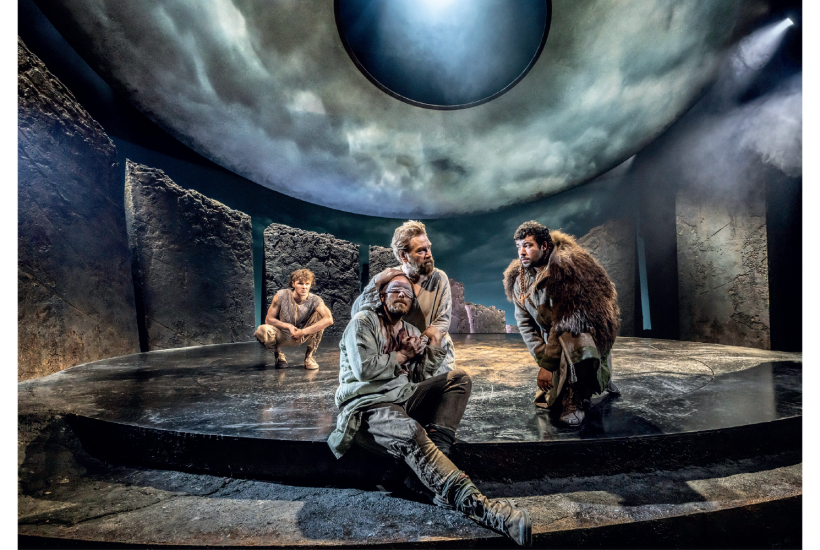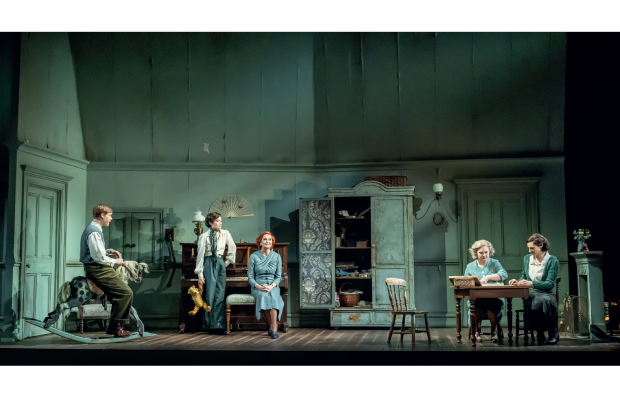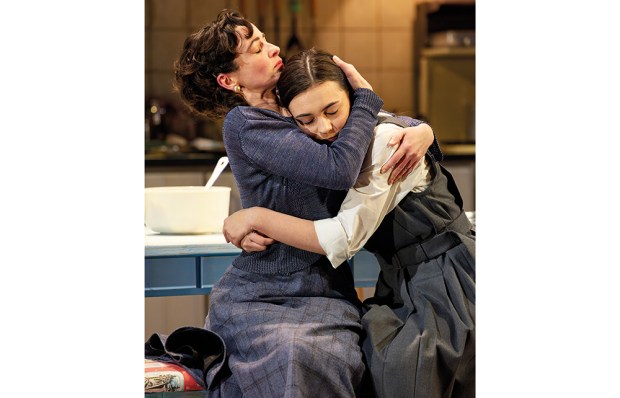Branagh vs Lear. The big fixture in theatreland ends in a win for Shakespeare’s knotty and intractable script which usually defeats any attempt to make it coherent or dramatically pleasing. This truncated version is a two-hour slug-fest set in the stone age – and it sort of works. The warriors fight with sharpened walking sticks and they stab each other using twigs whetted to a fine point. If you ignore the steel buckles and the writing paper, which were clearly invented earlier, you’ll find it just about believable. On stage, Branagh can’t quite banish the spirit of Noel Edmonds and he adds to the cheeky-chappie persona with a thick golden quiff (possibly a wig) and a mink collar that seems to have been backcombed and scented with talcum powder. In Lear’s court, all the menfolk resemble costumed Vikings at a Norwegian tourist attraction. The females wear off-the-shoulder furs and pashminas like dollybirds from a 1970s porn film. It’s a sexy line-up. All that’s missing is Raquel Welch.
The set is a bombed-out version of Stonehenge drawn by a graphic design student. A video projection above the fractured plinths shows thunderclouds and flocks of hungry raptors scouring the prehistoric tundra for fretful voles. But wait, is that a pterodactyl? No, it’s a heron. The main failing of Branagh’s performance is his bubbling, effervescent energy. He looks 40, not 80, and he finds comic elements in Lear rather than darkness and torment. His rages appear out of nowhere and when he goes bananas at the end he seems to have been styled by Vanity Fair. The best of the Viking support group is Cory Mylchreest as Edmund. Newcomers need to know that Kent (Eleanor de Rohan) is written as a morally courageous warlord and shouldn’t be played as an unemployed dinner lady. Fans of the text will miss Lear’s sexual disgust and the hints that he suffers from a genital infection. Also cut, perhaps for ideological reasons, is Lear’s recollection of Cordelia’s low-pitched speaking voice. ‘An excellent thing in woman,’ he says in the original. Not here. Obviously a dad who praises his daughter’s voice is a fascist pig. The show runs without an interval, and it feels like a visit to a booster-jab clinic. No one wants to be there but it’s worth celebrating once you’re clear of the building.
The Interview examines Martin Bashir’s successful campaign to interrogate Princess Diana for Panorama in 1995. Bashir is portrayed as a deceitful bounder who uses a sob story about a deceased loved one to ingratiate himself with Diana’s faithful minion, Paul Burrell. Moments later he uses the same trick to bewitch Diana. The friendship between the guttersnipe and the princess is brilliantly conceived and executed, and it unfolds with a fairy-tale simplicity, like the Eden yarn retold; an innocent beauty tempted by a wily serpent who poses as her admirer while plotting her ruin.
Yolanda Kettle’s impersonation of Diana is so good you’ll want to practise it during the interval. And Bashir’s spiritual tribulations are given an airing too. Born a Muslim, he converted to Christianity because he felt the need to ‘fit in’ at his south London comprehensive. The writer, Jonathan Maitland, is a freelance journalist who finds the story of Bashir’s dishonesty far more interesting than the royal psychodrama. But the audience is bound to disagree. Everyone loves royalty. No one gives a fig about lying hacks. Maitland’s fascination with journalistic probity ruins the second half which includes a limp 20-minute interlude devoted to the ethics of reporting with the dialogue put in the mouths of abstract unnamed characters. (This isn’t the first of Maitland’s plays to be marred by his fixation with ghosts.) It’s a shame but not a disaster for a production that belongs in a larger theatre. A canny script editor could save this show for the West End. Six out of ten but with minor adjustments, full marks.
Jeffrey Bernard’s Low Life columns were dramatised for the stage by Keith Waterhouse in a show that starred Peter O’Toole. The idea is that Bernard has got locked inside the Coach & Horses and he decides to entertain the audience while waiting for Norm, the publican, to set him free.
This revival is set in the actual Coach & Horses, in Soho, and it stars Robert Bathurst as the dipsomaniac scribbler. Bathurst is too spry and handsome to play Bernard (whose crenellated face resembled a chunk of whitewashed tree bark when he died aged 65 in 1997) but he captures the louche, scabrous indolence of the original. The show is a collection of mournful one-liners about ‘the enchanted dung heap of Soho’. Bernard arrived there as a teenager, ‘and after that I never looked forwards’. His frequent hospitalisations were complicated by his smoking habit. Accused by a nurse of trying to incinerate the hospital, he claimed that he only wanted to burn the bed. ‘I have no territorial ambitions.’
Got something to add? Join the discussion and comment below.
Get 10 issues for just $10
Subscribe to The Spectator Australia today for the next 10 magazine issues, plus full online access, for just $10.
You might disagree with half of it, but you’ll enjoy reading all of it. Try your first month for free, then just $2 a week for the remainder of your first year.














Comments
Don't miss out
Join the conversation with other Spectator Australia readers. Subscribe to leave a comment.
SUBSCRIBEAlready a subscriber? Log in